Hands up if you’ve been personally victimized by your thyroid on your pursuit of weight management!
Weight gain/weight loss resistance is one of the most pervasive symptoms of hypothyroidism. We are told over and over that eating less and exercising more is the solution to shedding unwanted pounds, but the reality is that approach isn’t going to work for everyone— especially someone with thyroid dysfunction.
Remember back in one of the first Thyroid School newsletters I mentioned that thyroid hormone is the only hormone used in every single cell? That’s a big deal because it means that despite your best “weight loss” efforts, your results may not reflect the energy and time you poured in. So, I was to review the science behind weight management woes in hypothyroidism, and then I’ll give you some valuable and practical advice for how to navigate.
The thyroid affects your weight in a few ways:
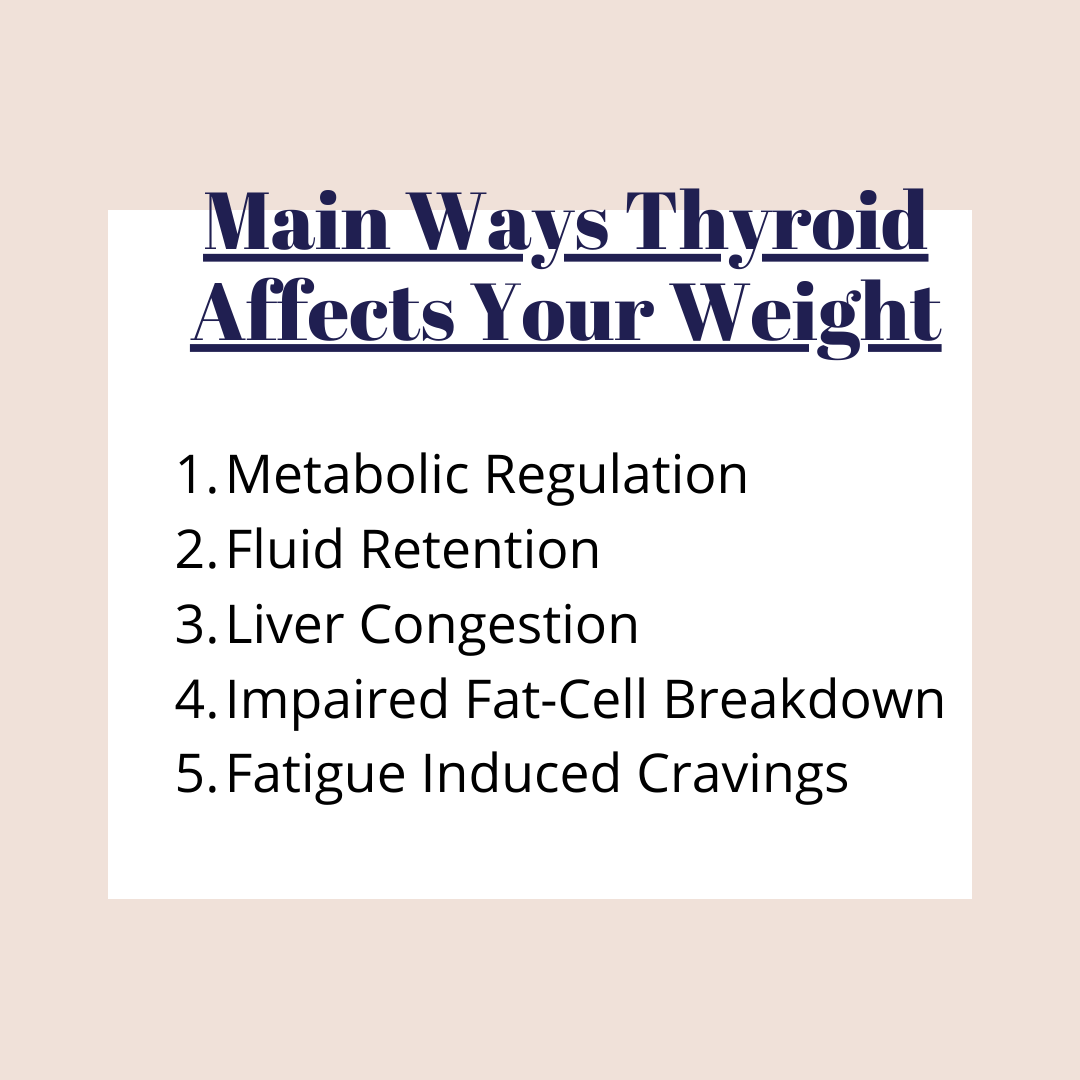
1. Metabolic regulation:
Think of your thyroid as the ringleader of your entire metabolism. The thyroid says “jump” and your cells ask “how high?”. Low thyroid function has massive downstream effects on your metabolism which affects your energy, weight, motivation, recovery, and a whole host of issues. Studies show over and over a direct correlation between high TSH and low T4/T3 levels with incrementally higher weight status– meaning that as TSH goes higher and T4/T3 goes lower, weight gain rises. This is due to the influence thyroid hormone has on your Basal Metabolic Rate (BMR)– the amount of calories burned at rest (without exercise, movement, etc.).
Additionally, thyroid hormone helps to stimulate lipolysis— the breakdown of fatty acids to be used for fuel (more on that later). Thyroid hormone also supports the process of muscle formation and remodeling. The amount of muscle mass you have on your frame directly impacts your BMR. Muscle = metabolism. Another way to put it: muscle = medicine.
Lastly, thyroid hormone helps to support proper insulin production and secretion. Insulin is important for getting glucose into your cells to fuel intra-cellular metabolic activity.
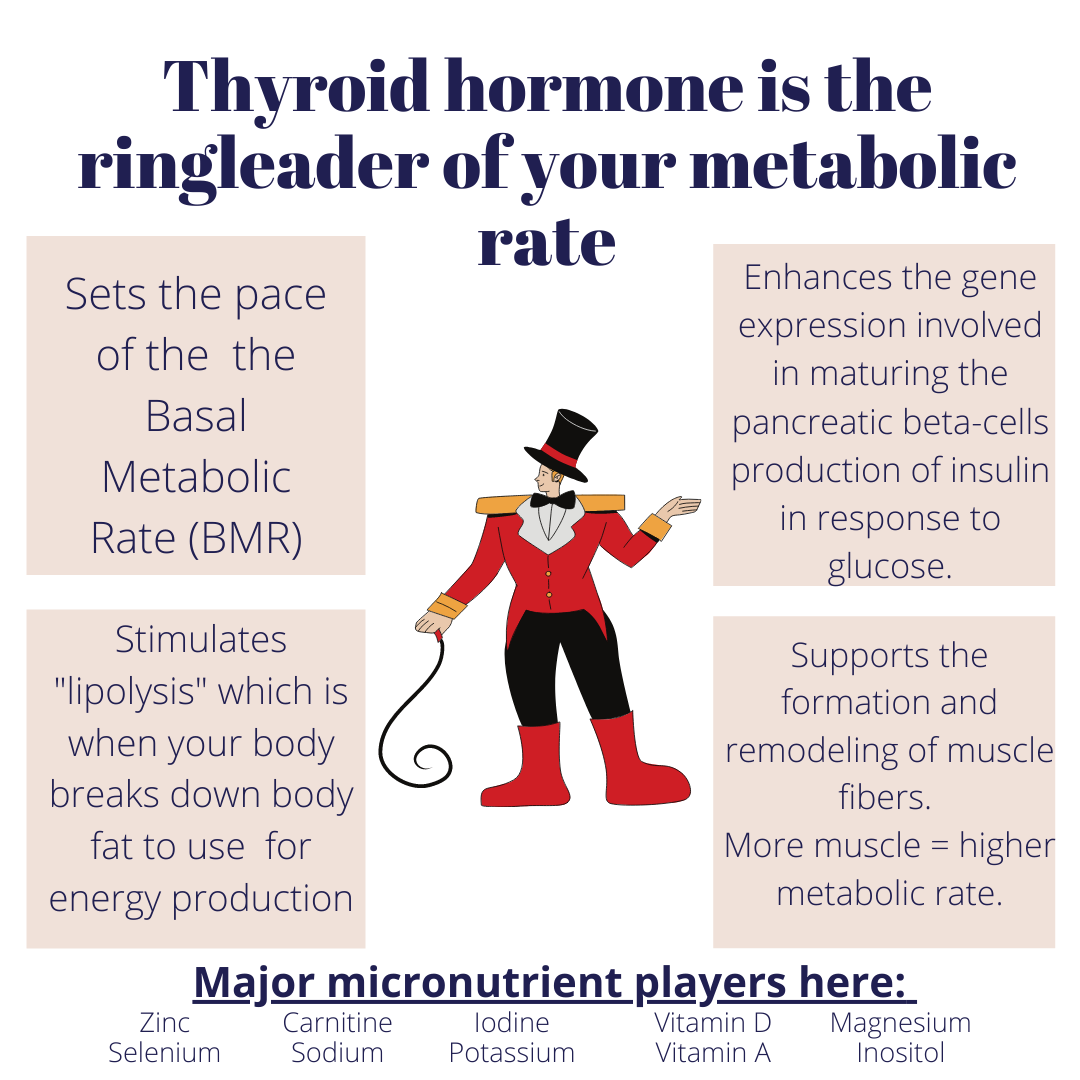
2. Fluid retention
Ever noticed puffiness around your eyes, rings fitting tighter, or like your tummy has a layer of fluid underneath the surface of your skin? This can certainly make you feel like your weight is creeping up, but in reality it is like fluid retention versus fat gain. One tell-tale sign that fluid is the culprit behind your weight gain is that your weight fluctuates 1/2-1+ pounds from one day to the next. It’d be nearly impossible to gain true fat mass in that short span of time.
There are several reasons for fluid gains including:
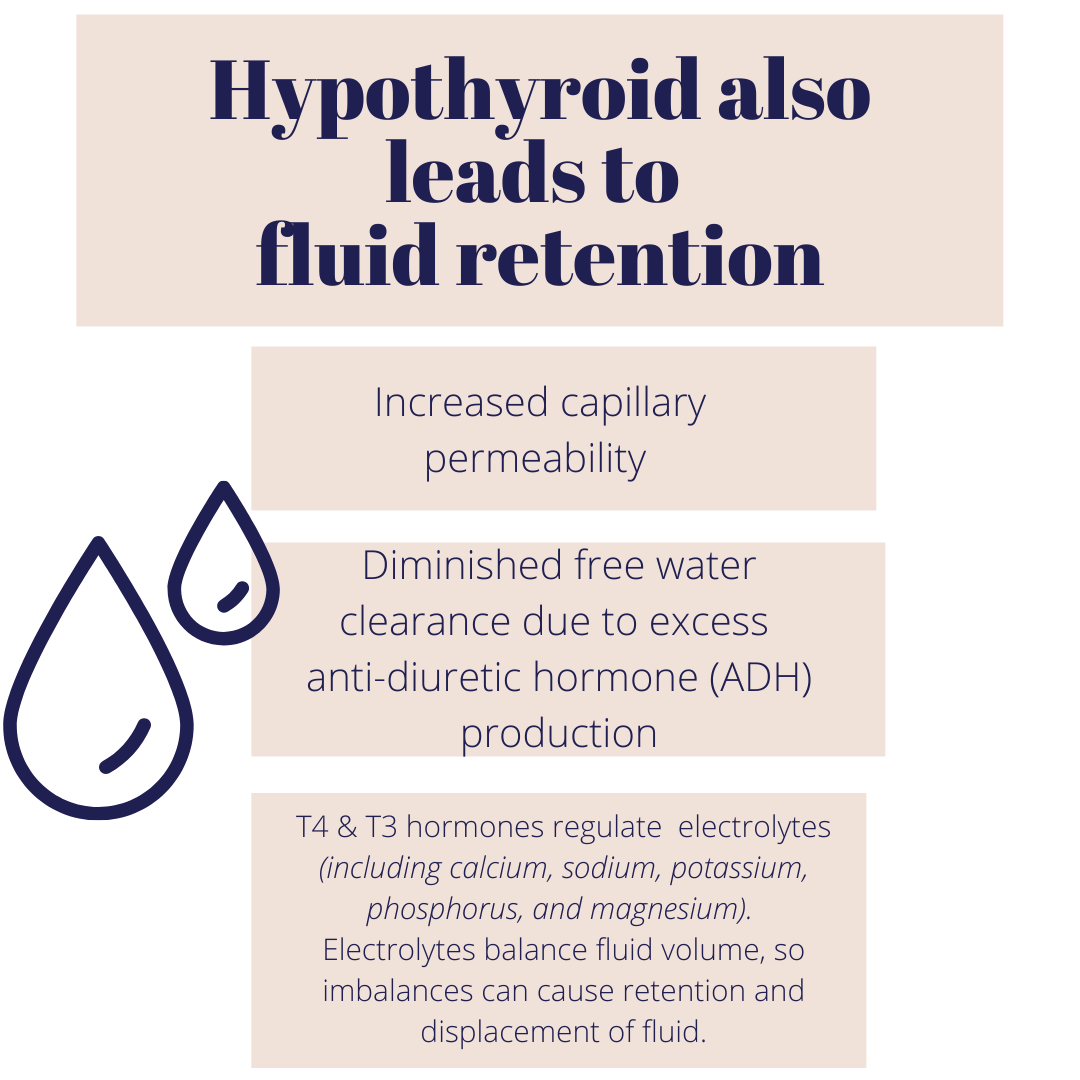
3. Liver congestion
Your liver is constantly hard at work regulating blood sugar, detoxifying, packaging up fats, and keep you alive. I’ve discussed in the past how the thyroid affects your liver and cholesterol formation, transport, and recycling. The liver is the primary spot for fat packaging and management, so hypothyroidism is a known contributor to liver congestion and even NAFL (non-alcoholic fatty liver).
On your weight loss journey, the body opens up fat cells and allows stored fatty acids to be used for energy and then excreted. When your liver is “backed up” (for a lack of better words), this process does not run very smoothly. Additionally, toxins are primarily stored in fat cells. When those fat cells release fatty acids for fuel, bits of toxins come with it. This normally isn’t problematic because the liver takes care of it via its intricate detoxification capabilities. That said, if the liver is congested and then inundated with toxins, that can lead to a build up of toxins in circulation. Obviously, your body doesn’t want that, so as a means to protect you, your body will resist shedding fat cells to prevent overburdening you with toxins.
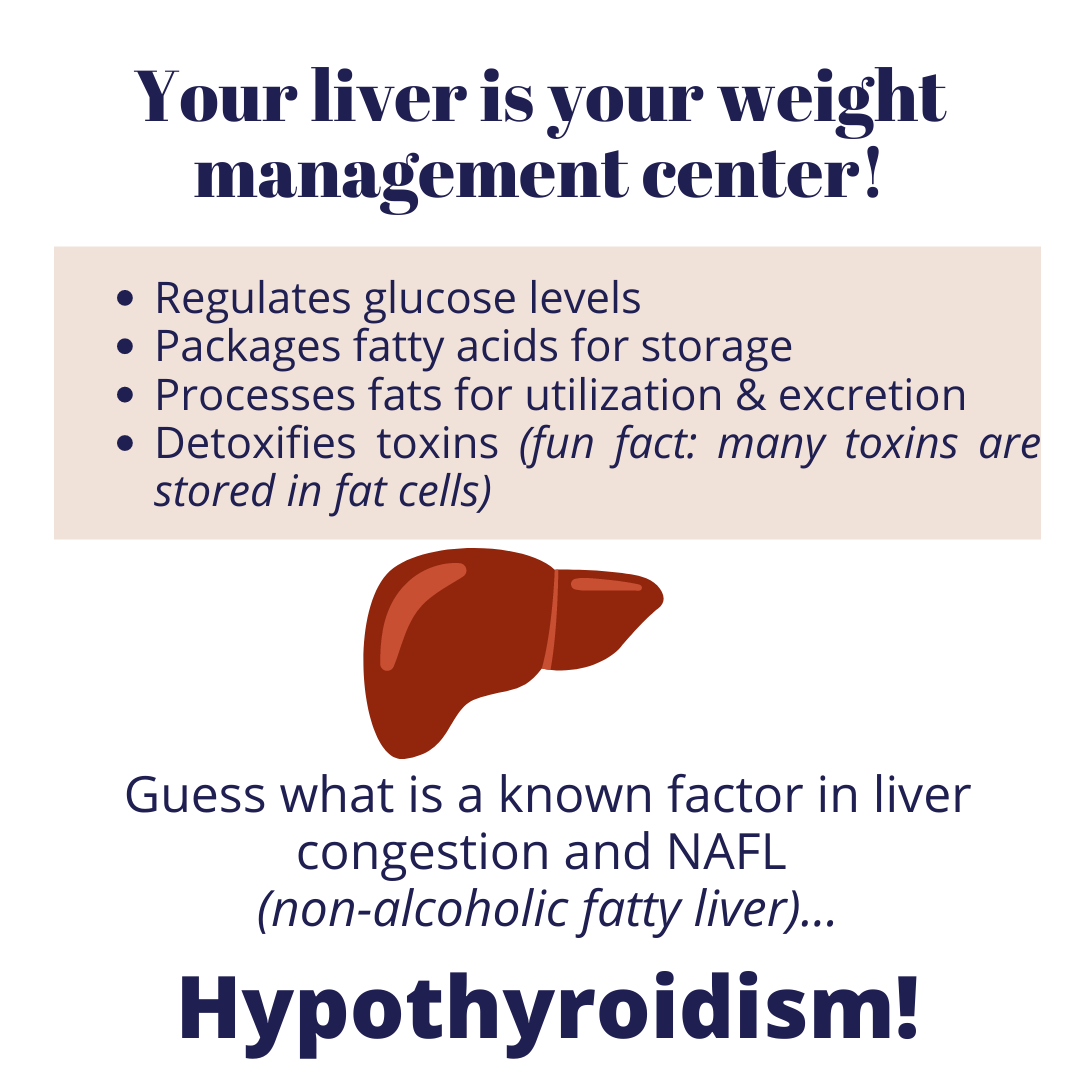
4. Impaired fat-cell breakdown
Thyroid hormones help to regulate lipolysis, or the breakdown of fat cells. The lower the thyroid hormone level, the less efficient this pathway is. This is also made more complex via an intricate relationship with leptin, insulin, and TRH/TSH, but that’s a story for another day!
A critical nutrient here is carnitine— an amino acid derived primarily from animal meat (root word: “carni” = flesh). Carnitine allows the fat cells to release fatty acids to be used as fuel. It plays a role in glucose regulation and muscle maintenance. While our body is able to make about 25% of the carnitine requirements, several side effects of hypothyroidism impair how well we obtain it from diet including: poor stomach acid secretion, SIBO (small intestinal bacterial overgrowth), other nutrient deficiencies (like zinc, Vitamin C, Vitamin B6), and genetic mutations like MTHFR.
Low carnitine levels not only impair the transport of fatty acids into the cells to be burned for energy, deficiencies can contribute to low muscle synthesis, muscle cramping, fatigue, and brain fog. This is a BIG reason that I don’t support vegetarian/vegan diets for hypothyroidism management.
5. Hypothyroid fatigue related cravings
Ever noticed that when 3 PM exhaustion rolls around your cravings for all the sweets, coffee, chocolate, vending machine goodies ramp up? This is not you lacking will-power— it’s biology! When you’re tired, your body sends hunger signals for foods that will provide the most efficient source of energy: simple-sugars, hyper-palatable (meaning it tastes REALLY good), salty, crunchy, and caffeine-filled. These foods are designed to be irresistible— especially when you’re tired and hangry.
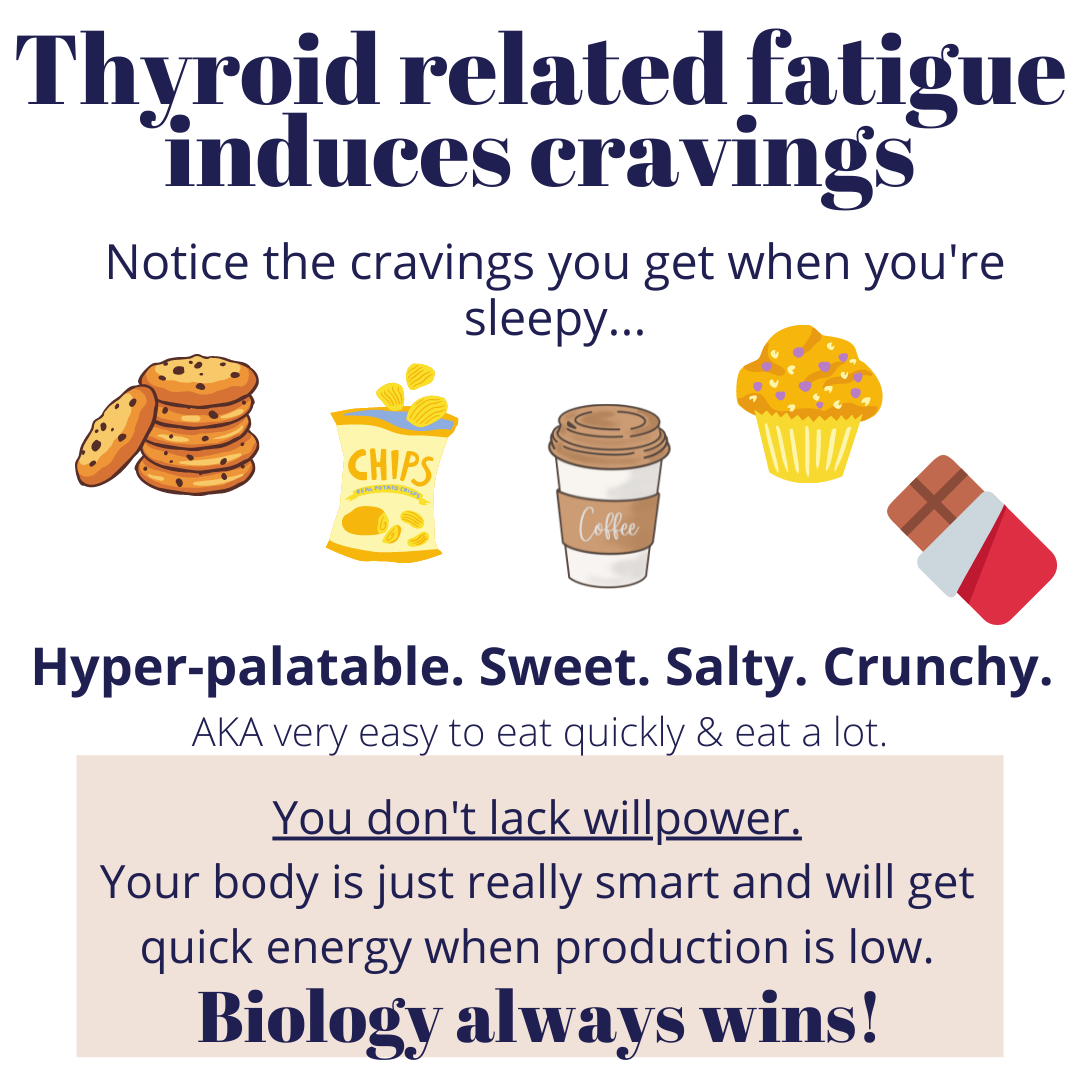
So, what to do?
I can confidently assume that a lack of results is not a reflection of your willpower nor is it a testament to how hard you’ve tried. Heck, most of the hypothyroid women I counsel 1:1 are some of the most focused and dedicated clients who aren’t afraid of hard work.
When you have hypothyroidism and your weight is totally stagnant or maybe even increasing, the logical side of your brain tells you to just eat less. While this makes sense mathematically, our bodies are much more complex than a math equation. Rather, our bodies are more like thermostats than calculators.
Humans are wired to adapt and survive. Survival depends on nourishment. When food becomes scarce and unpredictable, several things happen:
– metabolism slowwwwws down in an effort to preserve energy (AKA fat storage versus fat burning). The thyroid is the orchestrator to your metabolism which is why under-eating and yo-yo dieting can worsen hypothyroidism.
– muscle is sacrificed in an effort to provide glucose (sugar) for fuel (buh-bye muscle mass)
– preoccupation with food– especially hyper-palatable, quick sources of energy (enter insatiable sugar cravings, feeling out of control around food)
– voluntary restriction is not sustainable and will always be met with overcompensation in your food intake (sometimes to the point to binging)
– your body enters into “fight, flight, freeze” versus “rest, digest, reproduce, metabolize”. You may experience this as tummy problems, period irregularity, exhaustion, poor sleep, and weight issues
Messaging matters. The choices you make regarding food, activities you engage in, and the thoughts you have send direct messages to your body.
FOOD:
Optimizing quality is a foundational first step. While calories matter, the message those calories are sending matters more. What message does 100 calories of kale versus 100 calories of straight sugar send? I am a believer that “all foods fit”, but the reality is that some foods are like depositing into a bank account while others are like withdrawing. A balanced checkbook is the goal (did I age myself with this reference? LOL). What’s the point in saving all your money if you don’t get to spend it every once in a while, right? So ask yourself, what you’re doing overall contributing to a positive or negative? This requires a bird’s eye view and not getting hung up on each and every meal. This “balanced” concept is helpful to practice, so you see that what you do overall is what matters most.
EXERCISE:
You may consciously decide to wake up and immediately jump into high intensity exercise, for example, but your subconscious has not adapted to the idea. Our “survival” brain and “thinking” brain don’t always speak the same language, so while the thinking brain realizes what you’re doing, the survival brain gets the memo that there is a threat. This perceived stress downregulates all “non-essential” bodily functions in that moment including digestion, metabolism, sleep regulation, muscle building, etc. Stress tolerance has a threshold and everyone’s threshold is different. So, if you’re in a season of high stress (physically and/or mentally), ask yourself what message your exercise habits are sending.
MINDSET:
Your body hears what your brain thinks! You can be doing ALL THE THINGS, but if the narrative in your head is a perpetual barrage of self-loathing, inadequacy, disappointment, stress, fear, and trauma, it can be hard to move the needle in the right direction in the way your body feels and functions. In my opinion, mindset is one of the most influential, but most undervalued aspects of health. Many times, I suggest incorporating a counselor/therapist alongside the nutritional therapy I do with clients.
Beyond that, addressing the root causes of your hypothyroidism and tackling that to optimize your thyroid function can help make all of your weight management efforts come to fruition!
Nutritionally speaking, this means addressing blood sugar balance, inflammation, stress, gut health, and nutrient status. This is exactly why I have created my proven, effective, and trademarked method…The BRAIN Method
B: blood sugar balance
R: regulation inflammation
A: adrenal resiliency (stress)
I: intestinal support
N: nutrient repletion
So if you’ve tried ALL THE THINGS and still not seeing the scale move, consider diving deeper and addressing the root of the issue.Whether in my 1:1 visits or Thyroid Bootcamp online course + Labs, this is the framework I implement to ensure that each and every client is nutritionally supported to give their thyroid the love it deserves. Supporting these areas also allows for better utilization of your thyroid medications if you’re someone who takes thyroid replacement as the absorption, conversion, and utilization of thyroid replacement varies from person to person.
Regardless of what is best for your unique situation, do not settle for feeling less than awesome!
Disclaimer: Please note that “Thyroid School” emails from Chews Food Wisely, LLC (and Nicole Fennell, RD) are not intended to create any physician-patient relationship or supplant any in-person medical consultation or examination. Always seek the advice of a trained health professional about any questions you may have regarding a medical condition and before seeking any treatment. Proper medical attention should always be sought for specific ailments. Never disregard professional medical advice or delay in seeking medical treatment due to information obtained in “Thyroid School” emails. Any information received from these emails is not intended to diagnose, treat, or cure. These emails, websites, and social media accounts are for information and educational purposes only. The information in these emails, websites, and social media accounts is not intended to replace proper medical care.
Works cited:
Alqahtani HA, Almagsoodi AA, Alshamrani ND, Almalki TJ, Sumaili AM. Common Electrolyte and Metabolic Abnormalities Among Thyroid Patients. Cureus. 2021;13(5):e15338. Published 2021 May 30. doi:10.7759/cureus.15338
Nils Knudsen, Peter Laurberg, Lone B. Rasmussen, Inge Bülow, Hans Perrild, Lars Ovesen, Torben Jørgensen, Small Differences in Thyroid Function May Be Important for Body Mass Index and the Occurrence of Obesity in the Population, The Journal of Clinical Endocrinology & Metabolism, Volume 90, Issue 7, 1 July 2005, Pages 4019–4024, https://doi.org/10.1210/jc.2004-2225
Fox CS, Pencina MJ, D’Agostino RB, Murabito JM, Seely EW, Pearce EN, Vasan RS. Relations of thyroid function to body weight: cross-sectional and longitudinal observations in a community-based sample. Arch Intern Med. 2008 Mar 24;168(6):587-92. doi: 10.1001/archinte.168.6.587. PMID: 18362250.
Mullur R, Liu YY, Brent GA. Thyroid hormone regulation of metabolism. Physiol Rev. 2014;94(2):355-382. doi:10.1152/physrev.00030.2013
Khalid S, Asad-Ur-Rahman F, Abbass A, Gordon D, Abusaada K. Myxedema Ascites: A Rare Presentation of Uncontrolled Hypothyroidism. Cureus. 2016;8(12):e912. Published 2016 Dec 5. doi:10.7759/cureus.912
Front. Physiol., 11 December 2014 | https://doi.org/10.3389/fphys.2014.00479

EMAIL:
hello@chewsfoodwisely.com
VIRTUAL APPOINTMENTS ONLY
Business Mailing Address:
2525 Robinhood Street
Houston, Texas 77005
© 2026 Chews Food Wisely. All Rights Reserved. Website Designed by AVM
Disclaimers | Privacy Policy | Terms of Purchase | Terms and Conditions